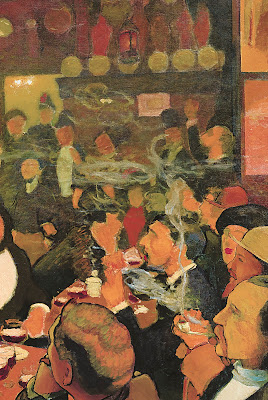§ 672 Cicero (De finibus, 2,15) goes so far as to allow two unblameworthy modes of discourse whose aim is not to be understood. One is when you are deliberately obscure, as Heraclitus was when he discoursed on nature with the utmost obscurity, the other when it is the obscurity of the subject matter in itself rather than the language that makes the discourse obscure, as is the case in Plato’s Timaeus. Here, then, you have two obscure thinkers who are unblameworthy. If you take ‘deliberately obscure’ to mean intentional obscurity κατ᾽αἴσθησιν [i.e., in how he is perceived] lest in his scientific and esoteric considerations he fall into obscurity κατὰ νόησιν [i.e., in how he is understood], and if you hold him to have discoursed thus in his writings on nature, then Heraclitus is unblameworthy: assuredly, he did not discourse in such a way as not to be understood, but rather in such a way as not to be understood by readers who almost entirely bring to bear an analogue of reason in their reading, while declining to exert the power of actual reason.
§ 673 If you construe him to be deliberately obscure when, rather than making sure he accommodates an audience that is not yawning but giving him the requisite attention, he pours forth darkness and peddles smoke with a mind set on doing so, and if at least in places he succumbed to this due to his melancholy and his contempt towards his fellow citizens, then Heraclitus is blameworthy. If you interpret obscurity of subject matter as that weakness on the part of most people whereby their minds are unable to comprehend a given thing that is by its nature remote from their sense perceptions, even though not only are others perfectly able to understand the same thing thanks to a more diligent exercise of their mental acuity but also Plato himself clearly and distinctly grasps the matter to be discussed, and if in the Timaeus you therefore deem him to speak of matters utterly dark, then for these reasons he is actually unblameworthy in his obscurity, since he does not discourse in such a way as not to be understood, but in such a way as not to be understood except by those who likewise take pleasure in the mental stimulation of contemplating, now seriously, now in a more relaxed and pleasant way, matters that are by their very nature remote from the senses.
§ 674 If you interpret obscurity of subject matter as
either the absolute obscurity proper solely to chimaeras, objective
dreams, utopian fictions (*) and interpretations thereof, or that of things
which from the contemplation of the human race 'the god coneals in murky
night' (†) so that we cannot fathom anything of them even by a probable
cause from aesthetics, meaning that nobody who would discuss them will
either understand them or ever even mentally perceive them in a lucid way, and if you concede that at least in places in the Timaeus
Plato sets out to depict things of this kind, or that by some other
path he falls into such avoidable obscurity of subject matter, then for
this reason he is not unblameworthy in his obscurity, it being baseless
to plead obscurity of subject matter as an excuse. For worst of all are ἀδιανόητα, i.e., words that are plain but have a hidden meaning (Quintilian, Institutiones Oratoriae, 8, 2, 20).
Alexander Gottlieb Baumgarten, Aesthetics, vol. 2 (1758),
trans. Alistair Ian Blyth
§ 672 L. de fin. II. 15. eo usque procedit, ut concedat duobus modis sine reprehensione fieri, si quis ita loquatur, ut non intelligatur. Si aut de industria facias, ut Heraclitus, qui de natura nimis obscure memorauit, aut quum rerum obscuritas, non verborum, facit, ut non intelligatur oratio, qualis est in Timaeo Platonis. Habes duos dogmaticos obscuros sine reprehensione. Si de industria obscurum interpreteris obscurum κατ᾽αἴσθησιν deliberato consilio, ne per meditationes scientificas et acroamaticas in obscuritatem κατὰ νόησιν incidat: si talem in scriptis suis physicis fuisse Heraclitum statuas: est ille quidem sine reprehensione, verum tunc non ita loquutus est, ut non intelligatur, sed ita, ut non intelligatur a lectoribus solum paene rationis analogon ad lectionem afferentibus, rationis autem nervos intendere recusantibus.
§ 673 Si de industria obscurum interpreteris eum, qui spectatoribus, quales praesertim attendere tenetur, non oscitantibus et merito requisitam attentionem offerentibus, tamen tenebras offundere, fumumque vendere fixum animo habet et propositum: si Heraclitus aliquando saltim, ex atra bile, contemtuque civium, eo lapsus est; non est sine reprehensione. Si rerum obscuritatem interpreteris eam plerorumque hominum infirmitatem, qua datam rem a sensibus suis natura remotiorem ne mente quidem assequuntur, licet eandem tum alii mentis aciem diligentius exercentes pulcre possint intelligere: tum ipse rem eandem tractaturus clare dilucideque perspiciat; si Platonem in Timaeo de rebus hac ratione subobscuris loqui senseris: hanc ob caussam obscurus est ille quidem sine reprehensione, verum nec ita loquutus est, ut non intelligatur, sed ita, ut non intelligatur, nisi ab iis, quibus volupe est aeque mentem acuere, rerum a sensibus per ipsam naturam remotarum contemplatione, nunc severiori, nunc remissa magis atque iucundiore.
§ 674 Si rerum obscuritatem interpreteris vel eam absolutam solis chimaeris, somniis obiectivis, figmentis utopicis ac eorum interpretamentis propriam, vel istarum rerum, quas intuitu generis humani adeo
Caliginosa nocte premit deus,
ut earum quicquam ne probabili quidem aestheticis ratione possimus hariolari, ut eas ne tractaturus quidem de iisdem vel intellexerit, vel dilucide saltim animo perceperit unquam: si Platonem in Timaeo, saltim aliquando, res eiusmodi pictum ire concesseris, vel alia via vitabilem rerum obscuritatem incurrere, hanc ob caussam obscurus non est sine reprehensione, nequicquam obscuritate rerum excusatus. Nam pessima sunt ἀδιανόητα, h. e. quae verbis aperta occulto sensu sunt. Quint. VIII. 2.
Alexand. Gottlieb Baumgarten, Aestheticorum Pars Altera,
Frankfurt: Kleyb, 1758
(*) Baumgarten defines as 'utopian' those primordial mythological fictions that are not grounded in metaphysical truth (veritas metaphysica).
(†) Horace, Carmina, 3, 29, 30.



































